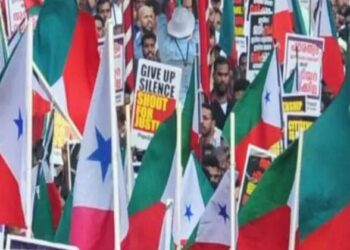New Delhi
(The PFI sought to enlist the backing of Hindu-Dalits. It got involved with the general elections in Assam where they pledged support to the “winnable” non-BJP candidates in five-six key Muslim dominated constituencies.)
The communalism and terror modules of the now outlawed Popular Front of
India (PFI) had sinister plans.
It was trying to be cleverer than its previous avatar of SIMI - which was hardcore and radicalised openly and in more ways than one.
The PFI presented a softer and 'more inclusive’ image and wanted to make deep penetration among various sections of Muslims including Shias and also tried to win over Christians and Dalits.
On the face value, the PFI sought to make an appeal not necessarily to one religious community, that is Muslims.
One official in the security establishment and in the know of things says the PFI was particular in not making any 'distinction' between any Muslim who shows interest in becoming a member, so long as they prayed regularly.
Therefore, the political wing SDPI allowed even non-Muslims to be members and active volunteers.
The PFI as a group gave membership to Sufis, Tablighis, and even Shias (although not Ahmadis).
"The plans were to cement unity among Muslims as well as among supposed marginalized communities like Dalits and also a section of Christians. Attempts to make entries into tribal segments however did not yield expected results," the source told 'Organiser'.
Recent revelations after the raids and more recent ban suggest all members of the group were expected to voluntarily donate "at least one percent of their monthly salary to the organization".
Needless to add, more the merrier. Some funds were used to provide temporary 'jobs' to youngsters from very poor families. Travel and other miscellaneous expenditures for PFI/SDPI works were met by the organisation, but sources often say such was the enthusiasm and level of commitment that many activists would discharge their duties totally free of cost.
The mission being - teach Kafirs/Hindus lessons of their lives.
Like the SIMI, the PFI gave its young Muslim workers and volunteers “a sense of power" and an organisation/agency which they were denied in their actual lives.
The PFI and SDPI made penetration in a political landscape where Muslim political representation within the large mainstream parties had declined due to various factors including the exponential growth of BJP in recent years.
The rhetoric and diabolical speeches focused on 'illusion of a solution' to multiple socio-political and economic challenges faced by Muslims. The activists worked on a network and even helped young students get passports, visas and admissions in some Muslim countries.
From the northeast, especially Assam and parts of West Bengal, a good number of students were assisted to get admissions in medical institutes in Bangladesh, some technical institutes in countries such as Malaysia and Gulf nations.
Involvement in SIMI activities always came with a risk. One risk being chances of escalation of communal violence and thus getting arrested.
With the PFI things looked 'safer' bets.
The PFI also engaged in building schools for poor Bengali-speaking Muslim communities in Assam, says another source.
The probe agencies worked overtime with regard to PFI and such radical bodies activities in Assam and parts of West Bengal and possibly also in small parts of Jharkhand and Bihar.
According to some experts, the SIMI or PFI took ideological inspiration from a few radical organisations in Bangladesh and maybe there were some 'operational and financial nexus' as well.
In 2015, the Bangladesh government had banned the Ansarullah Bangla Team (ABT) for their involvement in killing three secular/atheist bloggers— Anant Bijoy, Avijit Roy, Washiqur Rahman.
These bloggers criticized organized religion and the intolerance of Islamist radicals. Some elements in Bangladesh had links in Assam and parts of West Bengal, sources say.
The ABT as an organisation had been on the radar of Bangladesh security agencies since 2013-14 and the security agencies in India also got some vital inputs.
The context behind the ABT’s rise lay in multiple factors. Some socio-political developments in India were always referred to by the hardliners.
Although the 1971 Liberation War in Bangladesh is a cherished chapter in Indo-Bangladesh relations, it is also a fact that though this episode marked the triumph of linguistic nationalism in East Pakistan (Bangladesh), the Islamists were not fully eradicated.
The Jamaat-e-Islami (JI), the leading Islamist group, benefitted from patronage received from successive regimes in Dhaka and also got logistic and financial assistance from Pakistan.
These Jehadi elements also cooperated with north east India's insurgent outfits including ULFA and NSCN.
For two consecutive years, 2019 and 2020, the PFI celebrated its thirteenth and fourteenth foundation day all over India including in Assam under the theme “Fight and Defeat Politics of Hate". In the 2019 function held near Guwahati, even delegates from the Bodoland Territorial Autonomous Districts Minority Students Union, All India Imam Council, and Campus Front of India (CFI) had attended.
The PFI even decided to get involved with the general elections in Assam where they pledged support to the “winnable” non-BJP candidates in five-six key Muslim dominated constituencies.
Ends






No comments:
Post a Comment